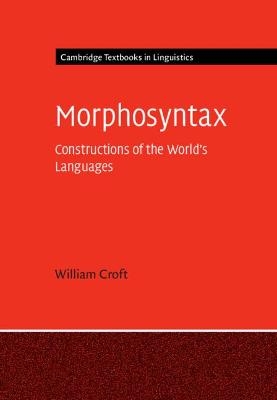
Morphosyntax
Cambridge University Press (Verlag)
978-1-107-47461-1 (ISBN)
Bringing together the results of sixty years of research in typology and universals, this textbook presents a comprehensive survey of Morphosyntax - the combined study of syntax and morphology. Languages employ extremely diverse morphosyntactic strategies for expressing functions, and Croft provides a comprehensive functional framework to account for the full range of these constructions in the world's languages. The book explains analytical concepts that serve as a basis for cross-linguistic comparison, and provides a rich source of descriptive data that can be analysed within a range of theories. The functional framework is useful to linguists documenting endangered languages, and those writing reference grammars and other descriptive materials. Each technical term is comprehensively explained, and cross-referenced to related terms, at the end of each chapter and in an online glossary. This is an essential resource on Morphosyntax for advanced undergraduate and graduate students, researchers, and linguistic fieldworkers.
William Croft is Professor Emeritus at the University of New Mexico. He is the author of dozens of articles and nine books, including Typology and Universals, Radical Construction Grammar, Explaining Language Change, Cognitive Linguistics (with Alan Cruse), Verbs and Ten Lectures on Construction Grammar and Typology.
Part I. Introduction: 1. Grammatical Constructions, Semantic Classes and Information Packaging; 2. Propositional Act Constructions: The Skeleton of a Sentence; Part II. Argument Phrase Structure: Reference and Modification: 3. Reference and Referent Expressions; 4. Modification: Semantic Types and Morphosyntactic Strategies; 5. The Structure and Origin of Modification Constructions; Part III. Clause Structure: Predication and Arguments: 6. Event Structure and Argument Coding: Semantics, Transitivity and Alignment; 7. Event Structure and Nonprototypical Argument Coding; 8. Argument Coding and Voice: Discourse Factors; 9. Argument Coding and Voice: Salience of Peripheral Participants; 10. Nonprototypical Predication and Nonpredicational Clauses; 11. Information Packaging in Clauses; 12. Speech Act Constructions; 13. Eventive Complex Predicates and Related Constructions; 14. Stative Complex Predicates, including Manner; Part IV. Complex Sentences: 15. Temporal and Causal Relations Between Events: Coordinate Clause and Adverbial Clause Constructions; 16. Reference-tracking in Coordinate and Adverbial Clause Constructions; 17. Other Semantic Relations Between Events: Comparative, Conditional, and Concessive; 18. Events as Arguments: Complement Clause Constructions; 19. Events as Modifiers: Relative Clause Constructions.
| Erscheinungsdatum | 25.07.2022 |
|---|---|
| Reihe/Serie | Cambridge Textbooks in Linguistics |
| Verlagsort | Cambridge |
| Sprache | englisch |
| Maße | 168 x 245 mm |
| Gewicht | 1250 g |
| Themenwelt | Geisteswissenschaften ► Sprach- / Literaturwissenschaft ► Sprachwissenschaft |
| ISBN-10 | 1-107-47461-2 / 1107474612 |
| ISBN-13 | 978-1-107-47461-1 / 9781107474611 |
| Zustand | Neuware |
| Informationen gemäß Produktsicherheitsverordnung (GPSR) | |
| Haben Sie eine Frage zum Produkt? |
aus dem Bereich


